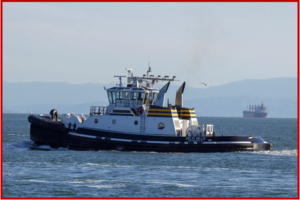The California Air Resources Board today approved updates to its Commercial Harbor Craft Regulation aimed at reducing emissions from harbor craft like tugboats and ferries operated near California’s coast to improve public health in nearby communities, many of which are disadvantaged.
The amendments affect all categories of commercial harbor craft and establish the first emission standard requirements for commercial passenger fishing vessels, pilot vessels, tank barges over 400 feet, work boats and research vessels.
These vessels are required to use cleaner engine fuel to reduce emissions under the current regulation, but they were not required to upgrade to cleaner engines previously. CARB held hundreds of public meetings, several public workshops, considered stakeholder input and conducted site visits to develop the amendments.
By 2035, the amendments are expected to result in an 89% reduction of diesel soot (aka particulate matter) and a 54% reduction in nitrogen oxides. The amendments will also reduce the cancer risk to more than 22 million residents who live near the coast and up to 50 miles inland. The amendments are projected to yield more than $5 billion in health benefits.
Marine engines are regulated by so-called tiers – with Tier 1 being the earliest emission standard and Tier 4 being the newest, least-polluting standard. CARB is proposing a performance standard cleaner than Tier 4. Most harbor craft vessels use old engine technology such as Tier 2 engines that release 162 times more diesel particulate matter than a five-year-old school bus. With today’s amendments, the diesel soot reduction achieved by 2038 is equal to eliminating 246,000 heavy‑duty diesel trucks traveling from Los Angeles to Sacramento every day for a year, CARB said.
“Emissions from harbor craft contribute to toxic diesel emissions from coastal and port activities,” said CARB Chair Liane Randolph. “These amendments will help clean the air and protect public health, especially in port-adjacent communities that are already burdened by high levels of air pollution.”
The current commercial harbor craft regulation accelerated the move to Tier 2 and 3 engines for select categories beginning in 2009 through 2022; the new amendments will require zero-emission options where feasible, and cleaner combustion Tier 3 and 4 engines on all other vessels. In addition, they will require the use of diesel particulate filters, which are standard equipment on new cars and trucks.
Short run ferries, which include those traveling less than three nautical miles over a single run, will be required to be fully zero-emission by the end of 2025. New excursion vessels, such as vessels offering whale watching or dinner cruises, are also required to be capable of operating with at least 30% of the power from a zero‑emission source.
The approved amendments include, for all vessel categories, compliance flexibilities such as fleet averaging or additional compliance time on other vessels in a fleet if a zero-emission vessel is deployed where it is feasible but not required.
The amendments affect all categories of commercial harbor craft and establish the first emission standard requirements for commercial passenger fishing vessels, pilot vessels, tank barges over 400 feet, work boats and research vessels. These vessels are required to use cleaner engine fuel to reduce emissions under the current regulation, but they were not required to upgrade to cleaner engines previously. CARB held hundreds of public meetings, several public workshops, considered stakeholder input and conducted site visits to develop the amendments.
Today’s amendments will begin phasing in starting in 2023 through the end of 2032. As a result of input from stakeholders, CARB incorporated compliance extensions for some vessel categories that would not have to upgrade until the end of 2034 if the vessel owner applies for and receives an extension if a replacement vessel is required but cannot be afforded. To address concerns raised by the sport-fishing industry, the Board approved changes recommended by staff that provide a one-time ten-year extension option for commercial passenger fishing vessels until 2035 if a vessel is equipped with all Tier 3 engines by the end of 2024. This change will provide more certainty for vessel owners, as well as come at a lower cost with no need to renew extensions every two years.



Pingback: Clean Truck, Bus CALSTART Incentives Available at CARB | AutoInformed